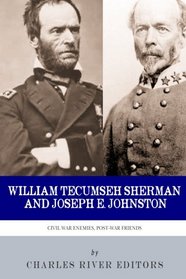Search -
Civil War Enemies, Post-War Friends: William Tecumseh Sherman and Joseph E. Johnston
Civil War Enemies PostWar Friends William Tecumseh Sherman and Joseph E Johnston
Author:
*Weaves the lives and careers of Sherman and Johnston together into one entertaining and educational narrative. — *Includes pictures of the generals and important people and places in their lives. — *Includes maps of important battles they fought in. *Discusses their relationship during and after the war. — *Includes Bibliographies of each general ... more »
Author:
*Weaves the lives and careers of Sherman and Johnston together into one entertaining and educational narrative. — *Includes pictures of the generals and important people and places in their lives. — *Includes maps of important battles they fought in. *Discusses their relationship during and after the war. — *Includes Bibliographies of each general ... more »
ISBN-13: 9781493707119
ISBN-10: 1493707116
Publication Date: 11/8/2013
Pages: 94
Rating: ?
ISBN-10: 1493707116
Publication Date: 11/8/2013
Pages: 94
Rating: ?
0 stars, based on 0 rating
Publisher: CreateSpace Independent Publishing Platform
Book Type: Paperback
Members Wishing: 1
Reviews: Amazon | Write a Review
Book Type: Paperback
Members Wishing: 1
Reviews: Amazon | Write a Review
Genres:
- Biographies & Memoirs >> Leaders & Notable People >> Military
- Biographies & Memoirs >> People, A-Z >> ( T ) >> Tecumseh




